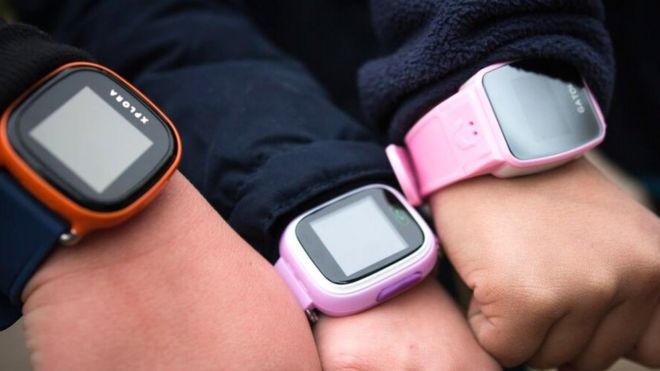 NCC
NCC
A German regulator has banned the sale of smartwatches aimed at children, describing them as spying devices.
It had previously banned an internet-connected doll called, My Friend Cayla, for similar reasons.
Telecoms regulator the Federal Network Agency urged parents who had such watches to destroy them.
One expert said the decision could be a "game-changer" for internet-connected devices.
"Poorly secured smart devices often allow for privacy invasion. That is really concerning when it comes to kids' GPS tracking watches - the very watches that are supposed to help keep them safe," said Ken Munro, a security expert at Pen Test Partners.
"There is a shocking lack of regulation of the 'internet of things', which allows lax manufacturers to sell us dangerously insecure smart products.
"Using privacy regulation to ban such devices is a game-changer, stopping these manufacturers playing fast and loose with our kids' security," he added.
In a statement, the agency said it had already taken action against several firms offering such watches on the internet.
"Via an app, parents can use such children's watches to listen unnoticed to the child's environment and they are to be regarded as an unauthorised transmitting system," said Jochen Homann, president of the Federal Network Agency.
"According to our research, parents' watches are also used to listen to teachers in the classroom."
The agency also asked schools to "pay more attention" to such watches among students.
Tracking children
Such watches - which are sold by a large number of providers in Germany - are generally aimed at children between the ages of five and 12.
Most are equipped with a Sim card and a limited telephony function and are set up and controlled via an app.
In October, the Norwegian Consumer Council (NCC) reported that 'some children's watches - including Gator and GPS for kids - had flaws such as transmitting and storing data without encryption.
It meant that strangers, using basic hacking techniques, could track children as they moved or make a child appear to be in a completely different location.
It is not clear whether the German decision to ban such devices was based on the privacy issues associated with them or wider security flaws that have been uncovered by NCC and others.
Both firms said that they had resolved the security issues.
Finn Myrstad, head of digital policy at the NCC said: "This ban sends a strong signal to makers of products aimed at children that they need to be safer."
He called for Europe-wide measures to increase the security of such devices.
Comments
Post a Comment